
Publisher:
Bonnie King
CONTACT:
Newsroom@Salem-news.com
Advertising:
Adsales@Salem-news.com

~Truth~
~Justice~
~Peace~
TJP
Dec-12-2010 02:11

 TweetFollow @OregonNews
TweetFollow @OregonNews
Fables of the Great Irish Famine
Tim King Salem-News.comThe terrorist and the policeman both come from the same basket. Revolution, legality—counter-moves in the same game; forms of idleness at bottom identical - Joseph Conrad (1857–1924)
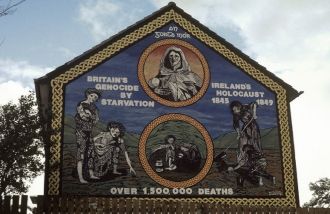 Ireland's Holocaust mural on the Ballymurphy Road, Belfast. "An Gorta Mór, Britain's genocide by starvation, Ireland's holocaust 1845–1849." Courtesy: Wikipedia |
(SALEM, Ore.) - A spin through Wikipedia under the search term 'Irish Potato Famine' leads to a page that describes a heartbreaking historic event; a potato disease that ravaged Ireland and killed a million people, while another million fled to places like the USA as starving refugees.
Mother nature can deal man a hard blow; recent tragedies that spun out of control like Hurricane Katrina and the tsunami that swept over much of Indonesia remind us of that.
How horrible it must have been to watch a problem from nature drive a nation of people into despair. It rings of of the American Dustbowl migrations only with a very fatal twist. Or was it?
I have been studying this history that preceded many years of armed conflict in Northern Ireland known as 'The Troubles' which so many are familiar with; even if only through U2 songs like Sunday Bloody Sunday.
The wars in Iraq and Afghanistan have done much to deflect interest from areas like Northern Ireland, and there is a very interesting historic connection with Afghanistan.
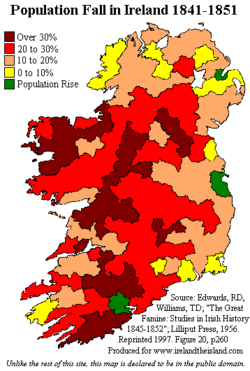 Population change in Ireland 1841–1851 |
As it turns out, the 'Great Potato Famine' is a ruse; we've been historically, simultaneously duped by the western media and academic community.
There may have been a problem with the potatoes, but the reason Irish people came to the USA, people like some of my own ancestors, is because the occupying British Army was loading Ireland's food supplies aboard their naval ships and transporting them to Afghanistan where the British were fighting in yet another conflict. Seem familiar?
As it turns out there was plenty of food, even though the British, who assumed control of the land and used it for their own purposes for hundreds of years, had changed the agricultural practices in Ireland to fit their own needs.
They had been occupying Ireland for 500 years by the time the 19th Century rolled around. Irish citizens were not allowed to hold political office; they were banned from professional roles; they were basically treated the way the Israelis regard the Palestinians today.
In fact there are many parallels. Perhaps that is why so many outspoken Irish people today are behind Palestinian freedom.
I would like to visit Northern Ireland to learn more of this history. There are endless stories of patriotism and tragedy.
The fully indoctrinated citizens of the US and UK generally failed to support the end of British rule; most simply responded to the cause of Northern Ireland by saying, "They are terrorists" believing they are tossing out an all-encompassing verbal blanket, when in fact they are not.
What's a Terrorist?ter·ror·ist Dictionary.com Unabridged Here is another: Word Origin & History terrorist in the modern sense, 1947, especially in reference to Jewish tactics against the British in Palestine -- earlier it was used of extremist revolutionaries in Russia (1866); and Jacobins during the French Revolution (1795) -- from Fr. terroriste ; see terror + -ist (also cf. terrorism). The tendency of one party's terrorist to be another's guerilla or freedom fighter was noted in ref. to the British action in Cyprus (1956) and the war in Rhodesia (1973). The word terrorist has been applied, at least retroactively, to the Maquis resistance in occupied France in World War II (e.g. in the "Spectator," Oct. 20, 1979). Online Etymology Dictionary, © 2010 Douglas Harper |
The word 'terrorist' is becoming increasingly vague in our modern society. Simply said, the term used to describe an enemy and consequently, place them in a particular category which, to the benefit of the oppressive nation; the US in this case, allows the government to literally strip these individuals of their rights granted under the Constitution.
The idea itself fully betrays any notion of real freedom or democracy; particularly when it was brought about by a government with the credibility of the recent Bush administration.
I had a friend once who had been a member of the Irish Republican Army (IRA) and eventually found his way out and landed in one the nation's hottest places; just outside of Yuma, Arizona.
He shared many stories of what it was like to grow up there, to become political at a very young age, and he talked about the friends he lost along the way. Of course this offbeat man whose name won't be used here, was clearly a 'terrorist' during his years with the IRA.
My friend Ken O'Keefe, also a Salem-News.com writer, fought Israeli commandos who boarded a ship in international waters last year killing nine unarmed peace activists in the process. O'Keefe, a former US Marine, disarmed two of the Israeli soldiers and prevented more death. For this he was given the notorious title: 'terrorist'. Perhaps it would best be viewed as a dubious honor.
Another friend who I think a a great deal of, was called a 'terrorist' by his own Australian government for writing and performing a song about Palestinian activist solidarity. Nelson Mandela was dubbed a 'terrorist' by both the Reagan and Thatcher governments. The term is losing water, finally.
'Terrorist' is what you call a person who fights oppressive governments with forceful or violent means. Sometimes the term is legitimately used. Israel for example, has laws and established behavioral patterns toward Palestinians that absolutely designate Israel a 'terrorist' state; but it is a US ally and therefore Israel's illegal war crimes are overlooked and the US and Canada and the UK all have a solid history of using veto power in the United Nations to block Israel from prosecution.
But the IRA was never forgiven; and the Catholic residents of Northern Ireland are still tormented by those of British stock who hold 'Orange Order' marches to torment the Catholics; celebrating the tragedy of British occupation that has been their national downfall for centuries. The word 'terrorist' is indeed vague.
The 1840's in Ireland
Skibbereen 1847 by Cork artist James |
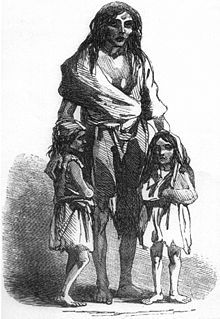 1849 depiction of Bridget O'Donnell |
There are plenty of people in the world who remain determined to keep the description of the potato famine in place, brushing off the event as a simple act of nature, when in fact the proceeds from Ireland's land during these dark years of occupation went to British landlords, and to fund a war in Afghanistan that the British miserably lost.
In fact during the first invasion of Afghanistan, they had their asses handed back in a basket. I've seen remaining British forts and castles in Afghanistan, possibly from the second British invasion of Afghanistan, I can't be sure; but what a site these places are. In fact I spent one day at a British 1800's fort with British Royal Marines; so much changes and yet remains the same.
Thomas Campbell Foster was appointed commissioner by "The Times" of London in 1845 to investigate "the condition of the people of Ireland", just prior to the potato crop failure and the ensuing horrors of the Irish Famine.
Foster filed a report from Dunfanaghy on 10 September of that year; describing a robust food supply in Ireland.
"The Ballyshannon Herald's" harvest report noted an average wheat crop, an abundant oats crop, more than an average crop of barley of excellent quality, and the turnip crop "looking well". The next sentence in its report began: "The potato crop looks most luxuriant but some are complaining that a disease has prevailed to a partial extent", chilling words when read in retrospect with full knowledge of the deaths, sufferings, emigration, and land clearances that followed.
As the Canadian Vindicator states, food produced in abundance in Ireland was shipped out of the country to pay rents to, in most cases, absentee landlords.
"There was abundant other food, but not for the starving Irish of Donegal, Fermanagh, Leitrim, Connacht, Munster, and parts of Leinster."
Foster carefully documented statistics on food production in Ireland based on his observations and also from the records and documents of estate managers; records that in no way conceal the man-made nature of the Famine.
Other food, if not abundant, was at least sufficient to make up the shortfall in potatoes.
When the British took over the Irish land in the years leading up to the great famine, men like the ruthless English landlord, George Charles Bingham, 3rd Earl of Lucan, took over land and then evicted his tenants en masse:
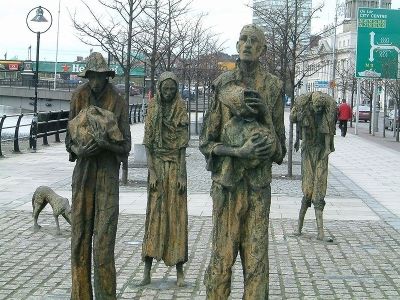 Famine Memorial in Dublin |
Historian Cecil Blanche Woodham-Smith (Fitzgerald) said in “The Reason Why”:“To the Earl of Lucan famine horrors were so many convincing demonstrations of the urgent necessity of clearing the land. The land could not support the people, could never support the people; so the people must go. He did not consider it was his responsibility, any more than the English Government considered it was their responsibility, to arrange how the people should go and where. He was getting nothing from his estates… A large part of the population of Ireland must disappear. Ten thousand people were ejected from the neighbourhood of Ballinrobe, and 15,000 acres cleared and put in charge of Scotsmen.
“Several populous villages in the neighbourhood of Castlebar completely disappeared, farms being established on the sites. Behind Castlebar House the Earl of Lucan established a large dairy farm. …in the town of Castlebar itself -- whole streets were demolished and the stones from the walls used to build barns and boundary walls… 'crow-bar brigades' (would) pull down cabins over the heads of people who refused to leave them. The Bishop of Meath saw a cabin being pulled down over the heads of people dying of cholera: a winnowing sheet was placed over their bodies as they lay on the ground, and the cabin was demolished over their heads...
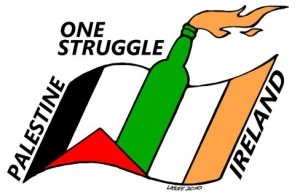
You could almost replace the names with Palestinian villages that, beginning in 1947, have been and continue to be demolished by the 'democratic' Israeli government. The exact same thing is happening today; American money funds the oppression; it is amazing and revolting to read the similarities between Palestine today and Ireland then.
During the famine in the mid 1840's, the Irish citizen's ability to maintain their own land and laws was nonexistent. As the people starved, the British ate well and learned to feel a little more superior.
Descriptions of food loaded onto British ships and exported from Ireland during the worst years, are amazing. There were bands of Irish who tried to fight back; of course they were considered 'terrorists'; imagine that.
One story, as related below, illustrates the cruelty-laden laws of the 1840's that prevented indigenous people from eating, and the accompanying attitude of the British oppressors. I think you could say they had a 'zero tolerance' policy for pesky Irishmen who wanted to give their children a bite of food.
Deputy Commisary General Dobree wrote about an outbreak of Irish violence from Waterford on 24 April 1846:"...during the few days the disturbances lasted, the populace showed great excitement and bad feeling, though they confined their outrages to the robbery of food, and dispersed immediately on the arrival of the military' the commanding officer of which declined complying with the magistrates' order to fire, as he felt he had force to quell the riot, and seize the ringleaders without bloodshed. The transit of food, however, through the country is not attempted without a strong escort.
The fighting in Northern Ireland that stems from a British occupation that began many centuries ago, and has greatly impacted Ireland in extremely negative ways, is for all intents and purposes over. But activists for Palestine like Fiachra Ó Luain, an Irish citizen; say the recent past should not be forgotten, as it is a classic tale of state sponsored terrorism against an indigenous people, again exactly as it is in Palestine today. This article is not intended to be a 'slam' to the good people of the UK; to me this story is similar to the genocide of the Native Americans in what is now the USA. The people to blame are long dead, but the lessons of this period must not be forgotten.
Sources:
House of Commons papers, Volume 37By Great Britain. Parliament. House of Commons
Learn the Truth: 1845/1850 It was Not a Famine
The Famine--"The Times"--and Donegal - Canadian Vindicator
Dust Bowl - From Wikipedia, the free encyclopedia
Great Famine (Ireland) - From Wikipedia, the free encyclopedia
Tim King: Salem-News.com Editor and Writer
Tim King is a former U.S. Marine with twenty years of experience on the west coast as a television news producer, photojournalist, reporter and assignment editor. In addition to his role as a war correspondent, this Los Angeles native serves as Salem-News.com's Executive News Editor. Tim spent the winter of 2006/07 covering the war in Afghanistan, and he was in Iraq over the summer of 2008, reporting from the war while embedded with both the U.S. Army and the Marines.
Tim holds numerous awards for reporting, photography, writing and editing, including the Oregon AP Award for Spot News Photographer of the Year (2004), first place Electronic Media Award in Spot News, Las Vegas, (1998), Oregon AP Cooperation Award (1991); and several others including the 2005 Red Cross Good Neighborhood Award for reporting. Tim has several years of experience in network affiliate news TV stations, having worked as a reporter and photographer at NBC, ABC and FOX stations in Arizona, Nevada and Oregon. Serving the community in very real terms, Salem-News.com is the nation's only truly independent high traffic news Website. As News Editor, Tim among other things, is responsible for publishing the original content of 65 Salem-News.com writers. He reminds viewers that emails are easily missed and urges those trying to reach him, to please send a second email if the first goes unanswered. You can send Tim an email at this address: newsroom@salem-news.com
Articles for December 11, 2010 | Articles for December 12, 2010 | Articles for December 13, 2010
Quick Links
DINING
Willamette UniversityGoudy Commons Cafe
Dine on the Queen
Willamette Queen Sternwheeler
MUST SEE SALEM
Oregon Capitol ToursCapitol History Gateway
Willamette River Ride
Willamette Queen Sternwheeler
Historic Home Tours:
Deepwood Museum
The Bush House
Gaiety Hollow Garden
AUCTIONS - APPRAISALS
Auction Masters & AppraisalsCONSTRUCTION SERVICES
Roofing and ContractingSheridan, Ore.
ONLINE SHOPPING
Special Occasion DressesAdvertise with Salem-News
Contact:AdSales@Salem-News.com

googlec507860f6901db00.html



Terms of Service | Privacy Policy

All comments and messages are approved by people and self promotional links or unacceptable comments are denied.
Ulsterman April 8, 2018 3:55 pm (Pacific time)
I always find it strange that the USA can bomb their way into any country for any reason they feel is useful at the time. Raul, your piece I can take on board and salute your view. JB, listening too much to the (SO CALLED IRISH HEROES) collecting money over there for the cause. Real heroes face their enemy and fight for what they believe. Your heroes, (in these so called troubles) killed innocent men women and children here for over 35 years. They killed more RCs than any loyalist groups or brits did combined. And as for you RALPH E "STONER", using Tony Blair's for any kind of reasoning in your thinking just floors me. Tony Blair and his mate G Bush have killed more innocents on this earth than any blited spudz ever killed over here. Living the dream is to live here and to call yourself an ULSTERMAN.. Goodnight and God bless.
Raul Reeve December 13, 2010 4:33 pm (Pacific time)
Anglo-Irish conflict isn't the whole story. The single variety of potato was grown because capitalist agriculture found it the most profitable crop in Ireland - monoculture is a consequence of capitalism in general, rather than British imperialism in particular. The evil landlords (some of whom were Irish) could not have predicted the famine. I'm not making any excuses, not denying the terrible tragedy, not denying that the government in London was the primary enforcer of capitalist rule... just that the Irish thing is much bigger in America than the anti-capitalist thing...
Tim King: Thanks for your observations...
JB December 12, 2010 6:23 pm (Pacific time)
The British should admit that it was an attempt at genocide. Ireland had plenty of food for it's people but the Brits stole it from them. Why America loves England is a mystery to me, we had to fight them for our independence, they fought us again in 1812 and lost, they supported the South in the Civil War and we had to rescue them in both world wars. All the time they were bulling their little neighbor, Ireland. Ireland fought back and won most of their island back but the only reason weak UK kept the fight up was because Ireland is so close to them and easy to send troops. Argentina could have kept the Falklands if they were as persistent as the Irish.
Ralph E. Stone December 12, 2010 8:18 am (Pacific time)
Congratulations to Tim for an excellent, informative article. I would add that in 1997, then British Prime Minister Tony Blair sent a letter to the sponsors of a weekend festival in County Cork, Ireland, commemorating the 150th anniversary of the Irish potato famine. The letter was read to an audience of about 15,000 at a concert by the Irish actor Gabriel Byrne. In it, Mr Blair said he was pleased to join in remembering those who had died and suffered during "the great Irish famine". He went on to say: "The famine was a defining event in the history of Ireland and Britain. It has left deep scars. That one million people should have died in what was the part of the richest and most powerful nation in the world is something that still causes pain as we reflect on it today. Those who governed in London at the time failed their people." Though he stopped short of a full apology, Blair went as far as any English leader ever has in expressing regret at his country's role in the famine, which killed more than one million people and spurred a mass emigration of more than one million Irish to escape starvation. Some have called the famine a genocide.
[Return to Top]©2025 Salem-News.com. All opinions expressed in this article are those of the author and do not necessarily reflect those of Salem-News.com.